China menace now on our doorstep, and we are singularly ill-prepared
In this season of wake-up calls, the Solomons agreement is the loudest.
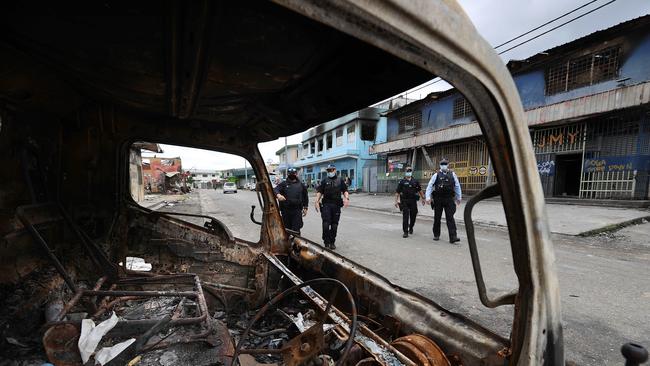
No one yet knows precisely what the security agreement signed between the Chinese government and Manasseh Sogavare’s Solomon Islands government will lead to, but it is a devastating blow to Australia’s national interests. No matter how the Morrison government tries to spin this, the Beijing-Honiara agreement represents a historic failure for Australian diplomacy and statecraft.
The text of the agreement is secret. The fact of its being signed was announced by the Chinese foreign ministry in Beijing. Sogavare says he will not publish the text without Beijing’s permission. He has promised Scott Morrison and other leaders in the Pacific, such as Papua New Guinea’s Prime Minister James Marape, there will not be a Chinese military base in his country.
For years Australian intelligence and assessment agencies have held the judgment that China seriously wants a military base in the South Pacific. Once, Beijing’s chief South Pacific ambition was to convince the remaining South Pacific nations that have diplomatic relations with Taiwan to switch to China. It succeeded in this with Solomon Islands in 2019.
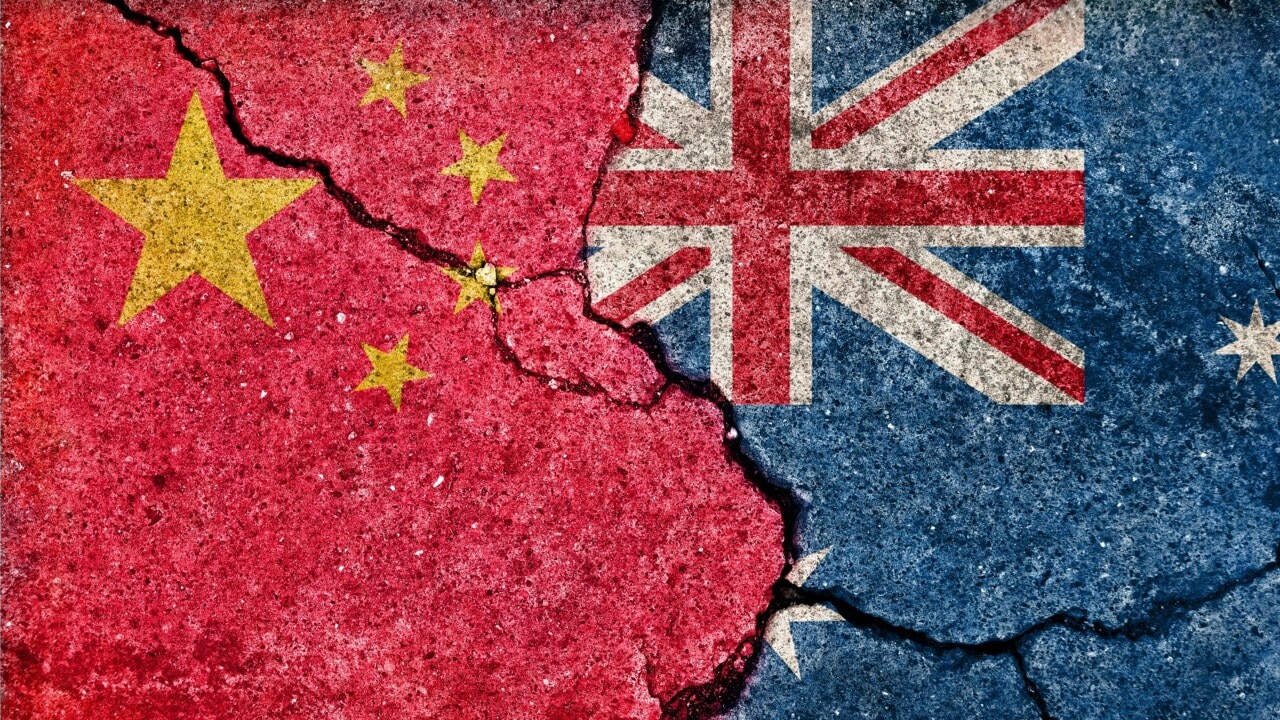
As we commemorate Anzac Day, we should recall that the fighting in the Pacific in World War II was the one time in its modern history that Australia’s national existence as a sovereign, independent nation came under grave and immediate threat. The Guadalcanal campaign and the critical naval Battle of the Coral Sea both centred on the Solomons, while the critical fighting in New Guinea was just next door. Australians are shamefully ignorant of this history. The last time our sovereignty and national existence was at risk, Solomon Islands, with New Guinea, was the critical strategic location. This time it’s still the critical strategic location, just 1700km northeast of Cairns. It is nearer to Cairns than Sydney is. It’s about the same distance from Cairns as Brisbane is.
Solomon Islands deserves our continued interest because of the 700,000 Pacific neighbours we have who live there. But it is also the case that Solomon Islands has always been fundamental to Australia’s strategic outlook.
The Japanese in World War II established their base there in part to cut Australia off from the US. The Chinese want a base there today to effect a modern version of the same strategy.
A Chinese military presence in the South Pacific would provide searing new headaches for US military forces. It would be a revolutionary setback for Australia and necessitate a fundamental rethink of the structure of the Australian Defence Force.
The fact this agreement was signed does not guarantee a Chinese military base will follow. Beijing has denied it wants one. But Beijing also denied it would ever militarise the islands it occupied, or in some cases built, in the South China Sea. Yet as Defence Minister Peter Dutton points out, Beijing now has 20 points of military presence in the South China Sea, including military grade air strips, naval facilities and so on.
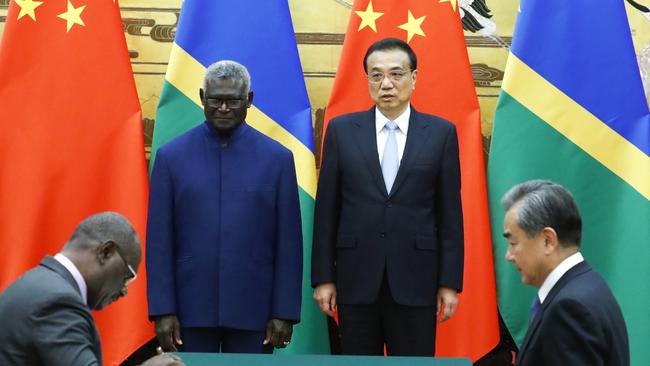
The draft of the agreement was leaked late last month. It contained extremely worrying language, including that China, according to its own needs, with Honiara’s permission, could “make ship visits to carry out logistical replenishment in, and have stopover transition in Solomon Islands”. It also said Honiara could request China to send “police, armed police, military personnel and other law enforcement and armed forces” to Solomon Islands. This could be to maintain social order, protect Chinese people or infrastructure.
That’s dangerously broad. It’s likely the final agreement reflects the draft agreement. Beijing has established significant commercial and military presence points in numerous ports in Africa, Southeast Asia, South Asia and elsewhere. Almost none of these countries began their association with China expecting this to be the destination.
Whatever assurances Sogavare gives today, there is every chance Beijing will proceed according to its own strategic calendar, opportunistic but ultimately programmatic, with a clear, fixed aim, but a great deal of tactical flexibility, and almost infinite resources, to deploy along the way.
Beijing sees itself in fundamental strategic competition with Washington, and associated, less intense, strategic competition with Australia.
The security agreement with the Solomons greatly advances its objectives.
The Chinese are under no pressure to rush. And they are likely to act, initially at least, in a fashion that doesn’t frighten the horses, so to speak. But Beijing is habitually agile and fast in these matters, as its actions in the South China Sea demonstrate. It does not operate at the glacial, paralysed, kabuki (choose your metaphor for movement so slow you cannot see it taking it taking place) pace of the Australian Defence Organisation.
But Beijing does have incentives to operationalise this agreement quickly. If it establishes a physical presence, takes out a long lease, maybe builds extended port facilities, and establishes a lot of its own personnel in Solomon Islands, while distributing plenty of money around the interests and personnel of the local elites, it could be virtually impossible for a future Solomons government to dislodge.
Already China is the Solomons’ biggest trading partner, taking most of its exports, especially from the logging industry. It has in many different cultural and political contexts shown great deftness in suborning elites with commercial contracts, travel, grants, flattery and every other kind of patronage.
Beijing takes the South Pacific very seriously. It is deeply involved in financing and maintaining much of the region’s infrastructure. It has large embassies throughout the region and posts many of the same diplomats repeatedly throughout the region. It has built up a solid cadre of Chinese South Pacific experts.
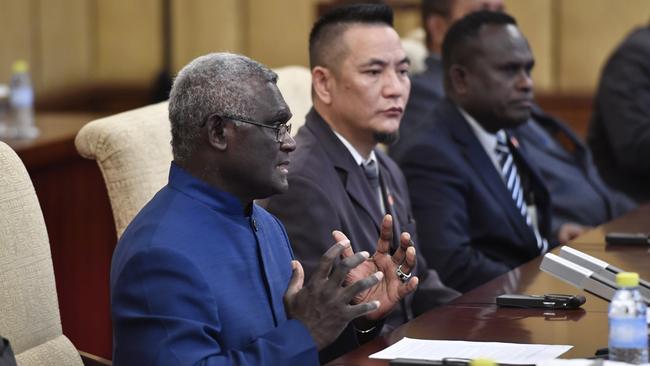
It studies political cultures and it studies individuals. Sogavare is perhaps the perfect specimen of the type of leader Beijing can influence. Those who know him say Sogavare is an extremely intense, tightly wound individual, a Seventh-day Adventist much caught up in his own mind. He has been Prime Minister four times and, within the Solomons context, is competent, shrewd, tactically adroit and unpredictable. His emotional intensity exaggerates his unpredictability. He has a big dollop of postcolonial anti-Australian sentiment.
At other times he can weep with gratitude for Australian police and military interventions that have sometimes saved his own situation. In November last year there were anti-Sogavare and anti-Chinese riots that led to another Australian police deployment. Sogavare’s prime ministership was saved. This didn’t lead to gratitude on Sogavare’s part. It led instead to an intensification of that special resentment that dependence can breed.
Sogavre is reported to have told his colleagues about mystical conversations he has had with dead Solomons leaders. There is indeed a streak of mysticism in Sogavare. He is susceptible to Chinese flattery, to the Chinese telling him that signing an agreement with them – which of course, they would say, he would always control – would show him as a statesman and an independent leader, free from the domination of Australia. He is also susceptible to Chinese cash. The Chinese embassy directly funded his office to pay Constituency Development Funds to individual Solomons politicians. Some politicians have claimed this fund was not paid to politicians who voted against Sogavare in a no-confidence motion that he survived.
Dutton has rightly pointed out that China plays by a different set of rules in seeking influence. All through the South Pacific Beijing is extremely active in political interference activities. It is very strong in PNG. New Zealand academic Anne-Marie Brady argues persuasively that Australia and its allies must fully, comprehensively educate South Pacific elites about Beijing’s political interference programs.
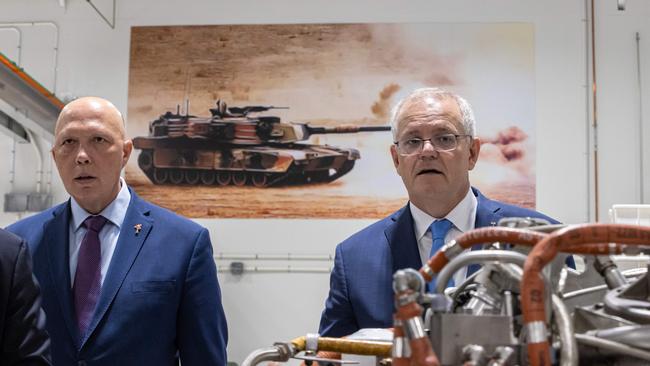
The fact Beijing plays by different rules is no excuse for Canberra being outmanoeuvred, comprehensively outplayed, as on this occasion, in the region of central strategic importance to us. All through the Cold War the US and its allies, including Australia, had to compete against the Soviet Union for influence when Moscow handed out bribes very aggressively. There are many ways to do this; some of them not so attractive, some of them no worse than a remarkable propensity for the children of leaders of important Third World nations to succeed in snaring scholarships to leading Western universities.
American policy also failed in the Solomons. The US has not had an embassy there in nearly 30 years. It lost interest once the competition with the Soviet Union faded. But neither were we ever able to persuade the Americans to reopen an embassy. They have just decided to do so now and Kurt Campbell, the Indo-Pacific affairs co-ordinator in the Biden administration, is leading a critically important US delegation to Honiara.
This is a joint failure by the US and Australia. A few years ago, as The Australian exclusively reported at the time, Washington asked Canberra to set up a resident embassy in North Korea for intelligence listening and assessment purposes. We declined, which was very dumb. We should have said yes, because North Korea is so important to us. But surely that would have been the time to say to the Americans, we’ll go to Pyongyang if you’llgo to Honiara. The Americans traditionally cede policy leadership to Canberra in the South Pacific, though frankly they often find our policy settings deeply sub-optimal. I remember a senior American years ago complaining to me that he could visit Pyongyang to talk to the worst dictatorship in the world but he couldn’t visit Fiji because at the time Australia was leading a de facto boycott of its then military government. During this period, China made headway in Fiji. Sometimes the sheer magnificent folly of Canberra policy is unfathomable.
The Solomons-China agreement demonstrates once more to the Americans the mistake of leaving South Pacific policy to us.
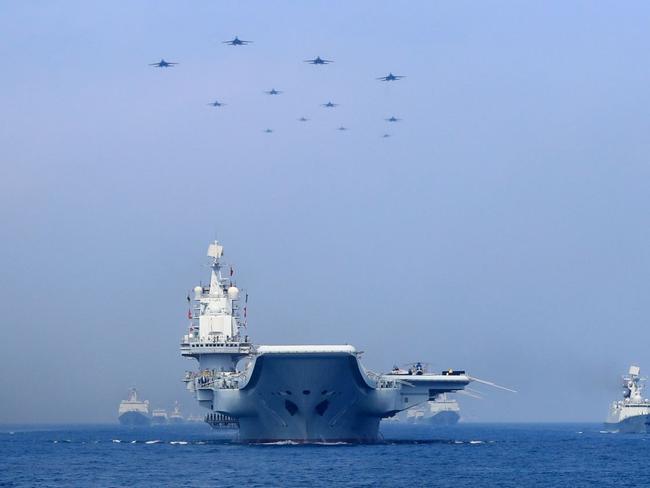
There must now be at the very least an even-money chance that in a few years Beijing will have a de facto naval base in Solomons. It would start with civilian ships, and then “grey zone” ships, which are military ships pretending to be civilian. There would be capacious physical premises that could house any manner of intelligence or other military equipment. Deputy Prime Minister Barnaby Joyce, presumably having read all the intelligence, has canvassed this as a possibility.
What would this, at present hypothetical, situation mean for the ADF? Rory Medcalf, head of the National Security College at the Australian National University, provides an answer: “We would need to devote a substantial portion of the ADF to that mission, in a permanent zone of surveillance and activity. We would have to have the capacity to surge. We would need some defensive capability in the area all the time. We’d need a submarine in the vicinity a lot of the time, and a couple of surface vessels. Because we would need to have the ability to over match the Chinese at any time. Because China itself would have the capacity to increase its presence at any time. China would be waging a kind of asymmetric leverage against us.
“And in any kind of conflict we’d have to have the will and the physical capacity to attack Solomons territory, which we haven’t envisaged before, and which would have severe diplomatic consequences.”
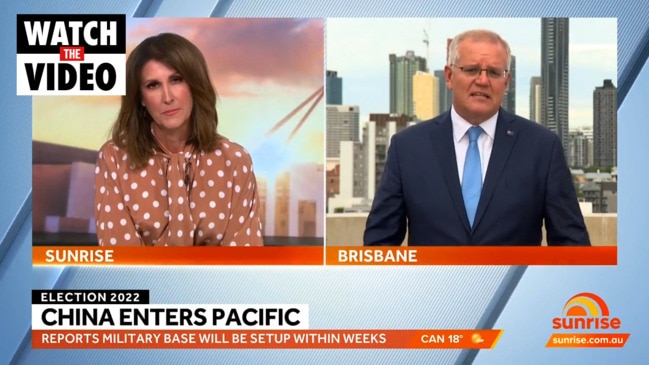
Everything Medcalf says is true, and that’s not the half of it. A Chinese military base in the Solomons would provide enhanced intelligence capabilities against Australia. It would closely study all our military comings and goings. We in turn would have to keep Solomon Islands under constant surveillance, not least with Poseidon surveillance craft. A Chinese military base could host submarines. It could deploy sea mines against any of our ports at very short notice. If it deployed air defences, it could compromise the safety of our aircraft anywhere in eastern Australia.
And there’s no reason at all to think Solomon Islands is the only South Pacific nation that could go down this road, given the money and influence Beijing can deploy.
We would need lots of missiles. We would need maritime drones and armed drones. But in a staggering decision that Australian Strategic Policy Institute head Peter Jennings rightly describes as “mind-bogglingly stupid”, we just killed the SkyGuardian program – the only armed drone program we had. This also means Border Force won’t get the maritime version of the Predator drones which, like SkyGuardian, could easily be armed and could serve our navy very well.
In this season of wake-up calls, the Solomon Islands agreement is surely the loudest of all. The government in its rhetoric demonstrates it understands the problem. But its actions bear no correspondence to the strategic need.


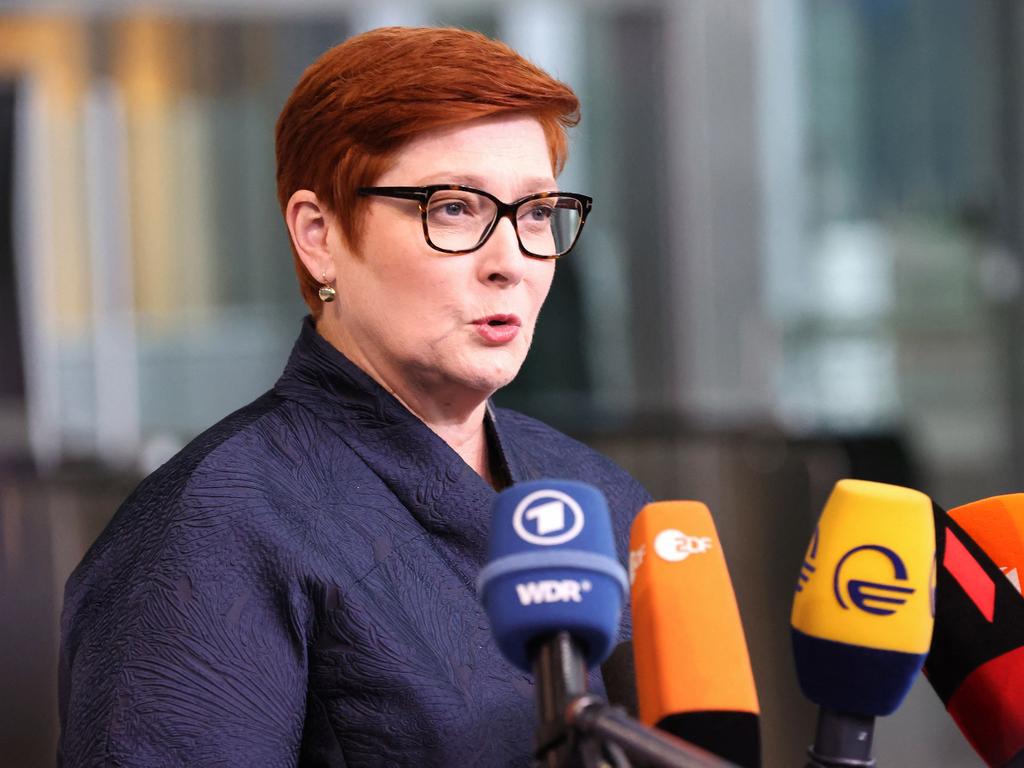


The Chinese military is coming to the South Pacific, and Australia is completely unprepared to deal with this sobering reality. Unprepared militarily. Unprepared diplomatically. We may be witnessing a revolution in our strategic outlook.